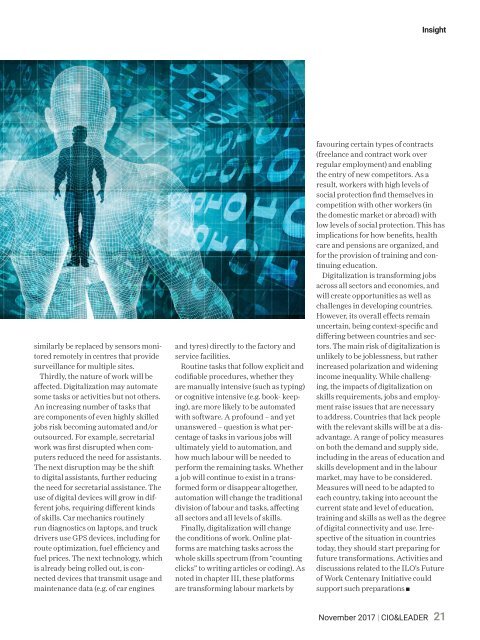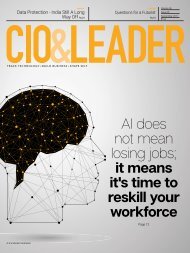CIO & LEADER-November 2017 (1)
Create successful ePaper yourself
Turn your PDF publications into a flip-book with our unique Google optimized e-Paper software.
Insight<br />
similarly be replaced by sensors monitored<br />
remotely in centres that provide<br />
surveillance for multiple sites.<br />
Thirdly, the nature of work will be<br />
affected. Digitalization may automate<br />
some tasks or activities but not others.<br />
An increasing number of tasks that<br />
are components of even highly skilled<br />
jobs risk becoming automated and/or<br />
outsourced. For ex<strong>amp</strong>le, secretarial<br />
work was first disrupted when computers<br />
reduced the need for assistants.<br />
The next disruption may be the shift<br />
to digital assistants, further reducing<br />
the need for secretarial assistance. The<br />
use of digital devices will grow in different<br />
jobs, requiring different kinds<br />
of skills. Car mechanics routinely<br />
run diagnostics on laptops, and truck<br />
drivers use GPS devices, including for<br />
route optimization, fuel efficiency and<br />
fuel prices. The next technology, which<br />
is already being rolled out, is connected<br />
devices that transmit usage and<br />
maintenance data (e.g. of car engines<br />
and tyres) directly to the factory and<br />
service facilities.<br />
Routine tasks that follow explicit and<br />
codifiable procedures, whether they<br />
are manually intensive (such as typing)<br />
or cognitive intensive (e.g. book- keeping),<br />
are more likely to be automated<br />
with software. A profound – and yet<br />
unanswered – question is what percentage<br />
of tasks in various jobs will<br />
ultimately yield to automation, and<br />
how much labour will be needed to<br />
perform the remaining tasks. Whether<br />
a job will continue to exist in a transformed<br />
form or disappear altogether,<br />
automation will change the traditional<br />
division of labour and tasks, affecting<br />
all sectors and all levels of skills.<br />
Finally, digitalization will change<br />
the conditions of work. Online platforms<br />
are matching tasks across the<br />
whole skills spectrum (from “counting<br />
clicks” to writing articles or coding). As<br />
noted in chapter III, these platforms<br />
are transforming labour markets by<br />
favouring certain types of contracts<br />
(freelance and contract work over<br />
regular employment) and enabling<br />
the entry of new competitors. As a<br />
result, workers with high levels of<br />
social protection find themselves in<br />
competition with other workers (in<br />
the domestic market or abroad) with<br />
low levels of social protection. This has<br />
implications for how benefits, health<br />
care and pensions are organized, and<br />
for the provision of training and continuing<br />
education.<br />
Digitalization is transforming jobs<br />
across all sectors and economies, and<br />
will create opportunities as well as<br />
challenges in developing countries.<br />
However, its overall effects remain<br />
uncertain, being context-specific and<br />
differing between countries and sectors.<br />
The main risk of digitalization is<br />
unlikely to be joblessness, but rather<br />
increased polarization and widening<br />
income inequality. While challenging,<br />
the impacts of digitalization on<br />
skills requirements, jobs and employment<br />
raise issues that are necessary<br />
to address. Countries that lack people<br />
with the relevant skills will be at a disadvantage.<br />
A range of policy measures<br />
on both the demand and supply side,<br />
including in the areas of education and<br />
skills development and in the labour<br />
market, may have to be considered.<br />
Measures will need to be adapted to<br />
each country, taking into account the<br />
current state and level of education,<br />
training and skills as well as the degree<br />
of digital connectivity and use. Irrespective<br />
of the situation in countries<br />
today, they should start preparing for<br />
future transformations. Activities and<br />
discussions related to the ILO’s Future<br />
of Work Centenary Initiative could<br />
support such preparations<br />
<strong>November</strong> <strong>2017</strong> | <strong>CIO</strong>&<strong>LEADER</strong><br />
21














